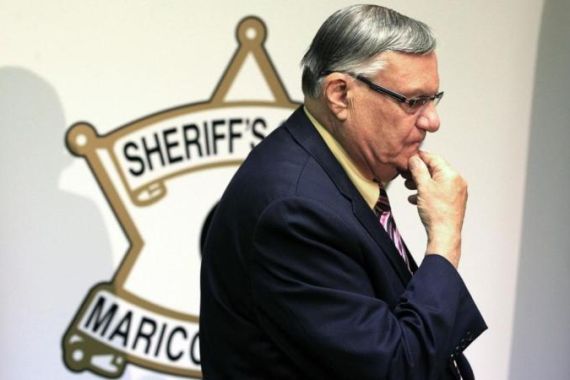Arizona: Shoot first, ask questions later
The self-described “toughest sheriff” in America is at it again, and this time his posse will be patrolling schools.

“Shoot first, ask questions later.”
That was the motto of the Texas Rangers, the once volunteer paramilitary force that helped maintain order in the 1800s through a very loose interpretation of the law. They were responsible for the mass murder of Mexicans and native Tejanos, victims of racial profiling who were served “justice” without due process.
This is how Anglo Texans were able to settle and cede so much Texas land so quickly in the early days of the republic. Remember James Dean’s protests in Giant?
Iconized by the Lone Ranger, John Wayne, and more recently, Walker, Texas Ranger; we equate Texas Rangers with heroic and patriotic duty, not genocide.
But there are new Rangers in town, this time in Arizona, and the target of this new proto-police force is the same – Mexicans and anyone who fits the profile. They are Sheriff Joe Arpaio’s Immigration Posse, a legal version of the Minutemen, also a volunteer force with the same agenda: put an end to undocumented immigration.
During President Barack Obama’s inaugural address, he again called for immigration reform. A bipartisan group of senators called the “Gang of Eight”, including Arizona Republicans John McCain and Jeff Flake, are charged with coming up with a comprehensive plan.
Democrats are urging for one that includes a path to citizenship for 11 million undocumented immigrants while McCain and Flake have made public pronouncements that their chief concern is to step up border security.
Democrats and Republicans may not be able to strike a deal until governors of the border states agree there is enough security. The Obama administration already has reinforced border security. There are more US Border Patrol agents today than at any time in recent history.
|
|
| Arizona immigration law: Patty Culhane reports from Washington |
But for Arizona figures like Governor Jan Brewer and Sheriff Arpaio of Maricopa Country, the self-described “toughest sheriff” in America, it will never be enough.
Arpaio started his immigration posse in 1993 to patrol mall parking lots during the holiday season when he said there was a spike in thefts. The posse soon graduated to immigration raids. Now Arpaio, in the wake of the mass shooting in Newtown, Connecticut, is organising his posse to patrol the schools.
This came after the National Rifle Association called for the placement of armed guards in public schools.
Arpaio will bring his brand of fear and suspicion to include anyone hanging around schools. This includes parents of every stripe waiting for their children in their cars.
They are after moms and dads and anyone “suspicious” hanging around a school, bringing yet another front to the war along the border. Now anyone is potentially suspicious, subject to profiling, and the violation of their civil liberties.
Arpaio and his posse already have a bad reputation for racial profiling, discriminatory practices, and unconstitutional searches and seizures. The sheriff has been sued by the US Justice Department for his methods.
This is just some of the collateral damage of using violence to secure the border.
The immigration posse is not paid but is insured by the state. This means that Arizonians will foot the bill for any mistake these untrained or barely trained armed guards make.
The parallels to the Minutemen, the Texas Rangers, and the immigration posse is not just forgotten, they are ignored. This is, after all, the state that bans a review of the very history that would help its citizenry recall the linkage between the Texas Rangers and the immigration posse. The vital history of the settlement of the state within the Southwest and the role of Native and Mexican-origin populations is exactly what is being outlawed as “ethnic studies”.
The entire operation of border security – surveillance, apprehension, and deportation – overwhelms the legal system and costs taxpayers billions of dollars each year. And a free-floating security detail does not remedy the problem of gun violence and lax gun laws.
When violence occurs, we want immediate responses. We might be willing to overlook small details like due process or civil liberties. Faced with a threat, some would rather shoot first and ask questions later.
Camilla Fojas is the Vincent de Paul Professor of Latin American and Latino Studies and Global Asian Studies at DePaul University in Chicago. She is the author of Border Bandits: Hollywood on the Southern Frontier (University of Texas Press). This op-ed was written in association with The OpEd Project, which seeks to expand the range of opinion voices.
